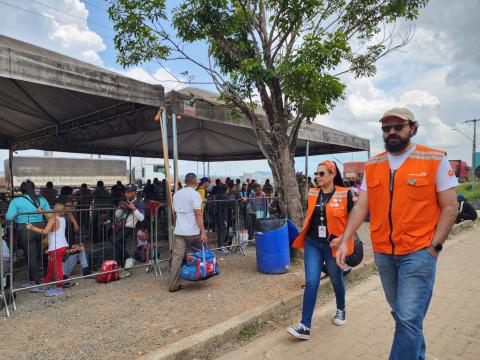World Vision's Humanitarian Response Addresses Increased Migration Flow at Brazil-Venezuela Border

In recent weeks, Venezuela has faced a worsening humanitarian situation, exacerbated by the social, political, and economic crisis. As a result, there has been an increase in people seeking international protection in Brazil.
In the border town of Pacaraima (RR), where World Vision is present through the projects "Hope Without Borders" and "Ven, Tú Puedes," daily entries have reached nearly 1,020 people, close to a historical record. A few years ago, the average was around 350 people per day, with occasional peaks of 600 people per day.
Of the 1,020 total, most of those entering the country are women heads of households and children, with children representing approximately 35% of the entries.
One cause identified for this situation is the change in legislation governing the entry of people without visas in Brazil, which came into effect on August 26. While the impact on the international protection (refugee) institute cannot yet be determined, the increase in migration flow is justified by the growing instability in Venezuela, coinciding with changes in Brazil's legal framework.
World Vision's team is monitoring the situation and providing support by reinforcing playful and protective activities for children in temporary shelter spaces (which are operating in contingency mode). The organization also plans to increase the distribution of non-food items (NFIs) in the region.
The National Coordinator of HEA (Humanitarian and Emergency Affairs) traveled to the border on Wednesday, August 28, to meet with the OPAC Command, UNICEF's Child Protection Officer Tila Galantini, and visit the Training and Reference Center, part of World Vision's presence in Pacaraima.
The trip also aims to reinforce World Vision's operations in the area, focusing on assisting displaced children and their families. Additionally, the coordinator's visit seeks to support local teams in integrating this contingency plan, addressing the immediate needs of the migrant flow, and positioning World Vision at the disposal of local church leaders and authorities.
Written by: Gabriel Louback, Communications Analyst at World Vision Brazil